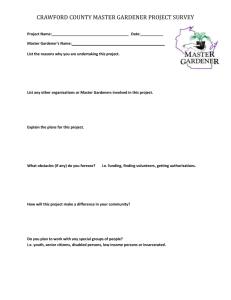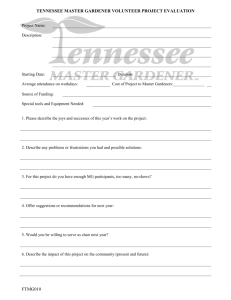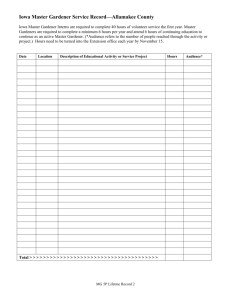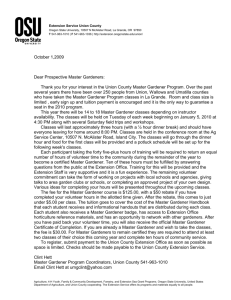The Maryland Master Gardener Program Policies and Guidelines
advertisement
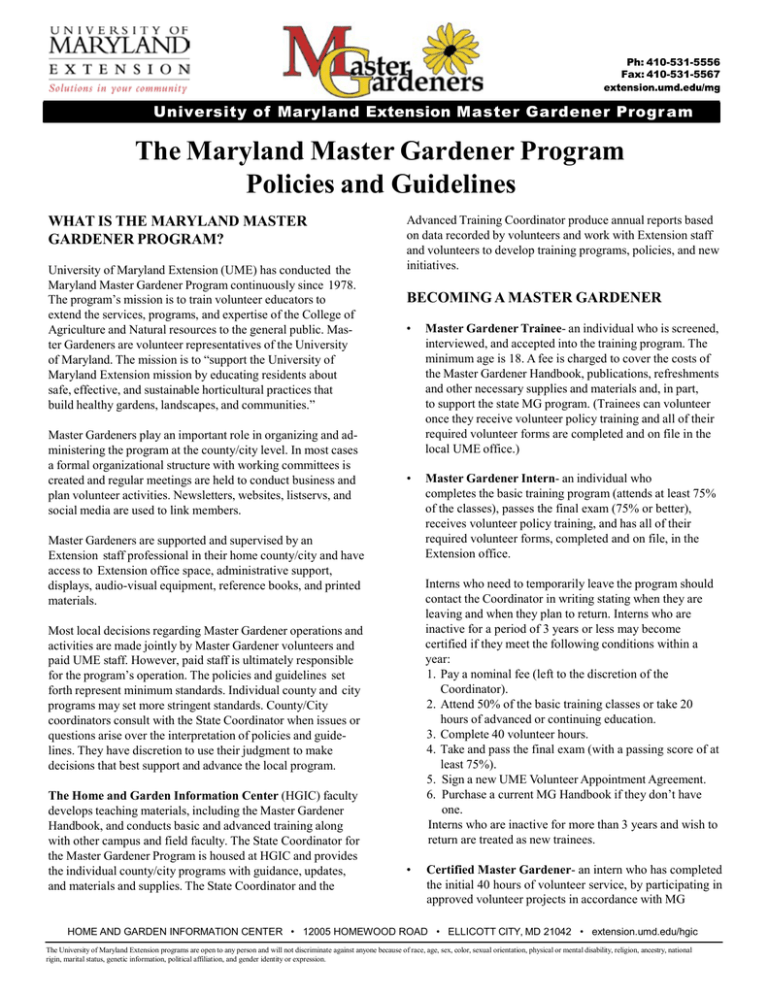
Ph: 410-531-5556 Fax: 410-531-5567 University of Maryland Extension Master Gardener Progr am The Maryland Master Gardener Program Policies and Guidelines WHAT IS THE MARYLAND MASTER GARDENER PROGRAM? University of Maryland Extension (UME) has conducted the Maryland Master Gardener Program continuously since 1978. The program’s mission is to train volunteer educators to extend the services, programs, and expertise of the College of Agriculture and Natural resources to the general public. Master Gardeners are volunteer representatives of the University of Maryland. The mission is to “support the University of Maryland Extension mission by educating residents about safe, effective, and sustainable horticultural practices that build healthy gardens, landscapes, and communities.” Master Gardeners play an important role in organizing and administering the program at the county/city level. In most cases a formal organizational structure with working committees is created and regular meetings are held to conduct business and plan volunteer activities. Newsletters, websites, listservs, and social media are used to link members. Advanced Training Coordinator produce annual reports based on data recorded by volunteers and work with Extension staff and volunteers to develop training programs, policies, and new initiatives. BECOMING A MASTER GARDENER • Master Gardener Trainee- an individual who is screened, interviewed, and accepted into the training program. The minimum age is 18. A fee is charged to cover the costs of the Master Gardener Handbook, publications, refreshments and other necessary supplies and materials and, in part, to support the state MG program. (Trainees can volunteer once they receive volunteer policy training and all of their required volunteer forms are completed and on file in the local UME office.) • Master Gardener Intern- an individual who completes the basic training program (attends at least 75% of the classes), passes the final exam (75% or better), receives volunteer policy training, and has all of their required volunteer forms, completed and on file, in the Extension office. Master Gardeners are supported and supervised by an Extension staff professional in their home county/city and have access to Extension office space, administrative support, displays, audio-visual equipment, reference books, and printed materials. Interns who need to temporarily leave the program should contact the Coordinator in writing stating when they are leaving and when they plan to return. Interns who are inactive for a period of 3 years or less may become certified if they meet the following conditions within a year: 1. Pay a nominal fee (left to the discretion of the Coordinator). 2. Attend 50% of the basic training classes or take 20 hours of advanced or continuing education. 3. Complete 40 volunteer hours. 4. Take and pass the final exam (with a passing score of at least 75%). 5. Sign a new UME Volunteer Appointment Agreement. 6. Purchase a current MG Handbook if they don’t have one. Interns who are inactive for more than 3 years and wish to return are treated as new trainees. Most local decisions regarding Master Gardener operations and activities are made jointly by Master Gardener volunteers and paid UME staff. However, paid staff is ultimately responsible for the program’s operation. The policies and guidelines set forth represent minimum standards. Individual county and city programs may set more stringent standards. County/City coordinators consult with the State Coordinator when issues or questions arise over the interpretation of policies and guidelines. They have discretion to use their judgment to make decisions that best support and advance the local program. The Home and Garden Information Center (HGIC) faculty develops teaching materials, including the Master Gardener Handbook, and conducts basic and advanced training along with other campus and field faculty. The State Coordinator for the Master Gardener Program is housed at HGIC and provides the individual county/city programs with guidance, updates, and materials and supplies. The State Coordinator and the • Certified Master Gardener- an intern who has completed the initial 40 hours of volunteer service, by participating in approved volunteer projects in accordance with MG HOME AND GARDEN INFORMATION CENTER • 12005 HOMEWOOD ROAD • ELLICOTT CITY, MD 21042 • extension.umd.edu/hgic The University of Maryland Extension programs are open to any person and will not discriminate against anyone because of race, age, sex, color, sexual orientation, physical or mental disability, religion, ancestry, national rigin, marital status, genetic information, political affiliation, and gender identity or expression. Policies and Guidelines. Master Gardeners receive a signed certificate and name badge upon successful completion of the training and 40 hour volunteer requirement. • Active Master Gardener- to remain an active, certified Master Gardener one must: 1. Provide at least 20 hours of certified volunteer service each calendar year. 2. Complete at least 10 hours of continuing education (not including travel time) through classes, webinars, seminars and other educational activities offered by UME, plant societies, botanical gardens and arboreta, colleges, nature centers, etc. Subject matter presentations made at Master Gardener membership meetings are also valid. 3. Record volunteer and continuing education hours. 4. Have a current, signed “Volunteer Appointment Agreement” form on file at the Extension office. 5. Depending on your county/city, there may be additional requirements for maintaining active status. (Note: The MG program does not have a dues requirement. Financial contributions by MGs are voluntary and are not a condition for maintaining active status.) • Master Gardener Emeritus- a MG who can no longer be active but wishes to stay connected to the program (attend social events and meetings, receive communications). Upon mutual agreement, the local MG Coordinator may grant this status (and an MG Emeritus Certificate) to a volunteer who makes the request. • Hiatus- a certified MG who wishes to become inactive due to personal circumstances. This status can last to 3 years. The MG makes a written request to the local MG Coordinator. If approved, a letter confirming the “on hiatus” status is placed in the volunteer’s file. Volunteers who have been inactive for 3 years or less may change their status to “active” by volunteering at least 20 hours per year and completing at least 10 hours of advanced training (see above). They also must sign a UME Volunteer Ap- pointment Agreement. Transfers Guidelines for Master Gardeners transferring from out of state: • Must present proof of prior MG training and certification. • Must purchase a Maryland MG Handbook. • Will be assigned a mentor and meet with MG Coordinator to determine training needs. • Take final exam as a take home test and score at least 75%. • Complete volunteer policy training and all necessary forms. • A small fee may be charged at the discretion of their MG Coordinator. Guidelines for Master Gardeners transferring between Maryland county/city program: • Will be assigned a mentor and will meet with their MG Coordinator to determine training needs. • Transfer and update paperwork. BENEFITS TO VOLUNTEERS UME has a vested interest in developing a corps of enthusiastic, knowledgeable and dedicated Master Gardener volunteers. Volunteers gain the following benefits from participation: • Opportunity to attend basic and advanced training programs covering all aspects of environmental horticulture. • Learn new skills and hone old ones. • Meet and work with other people interested in horticulture. • Gain personal satisfaction from “helping people to help themselves.” • Declare allowable, non-reimbursed, out-of-pocket expenses for income tax purposes. • Protection, through the Maryland Tort Claims Act, from lawsuits while performing volunteer duties in accordance with position description. RESPONSIBILITIES OF VOLUNTEERS • • • Terminated- a MG who no longer wishes to be part of the program or is dismissed from the program. • • Returning- a terminated MG who voluntarily left the program or a MG on hiatus or inactive for more than 3 years may return if the following conditions are met within one year: 1. Pay a nominal fee (left to the discretion of the Coordinator). 2. Attend 50% of the basic training classes or take 20 hours of advanced or continuing education. 3. Complete 20 volunteer hours. 4. Take and pass the final exam (with a passing score of at least 75%). 5. Sign a UME Volunteer Appointment Agreement. 6. Purchase a current MG Handbook if they don’t have one. • • • Follow the guidelines and procedures set forth by UME. Be considerate, respect others’ competencies and work as a member of a team with all professional and volunteer staff. Accept assignments of your choice that you feel comfortable with and that are compatible with your interests and skills. For volunteer activities, fulfill your commitment or notify your mentor, volunteer activity leader, or Extension professional early enough that a substitute can be found. Keep an accurate record of your continuing education hours and record them online on a regular basis. University of Maryland employees and volunteers are required by federal and state law and institutional policy to ensure that all programs and services are available to all people. Therefore, it is very important that you complete your volunteer log forms on a regular basis, including race and gender information for clientele with whom you have contact. When recording contact information, please • • • • • • enter information you collect concerning the number of client contacts made through plant clinics, phone calls, talks, workshops, information booths etc. Participant contact data is to be collected in a discrete manner. In activities with large attendance, make the best estimate you can. Identify participants as “Unknown” when you are in doubt as to race or ethnicity. When more than one Master Gardener is involved in an event, please take care that all contacts are accounted for, and that the contact numbers are not duplicated by individual Master Gardeners. Assist UME professionals in soliciting and collecting survey and evaluation data to measure program impact. Attend regularly scheduled meetings and actively participate whenever possible. Provide feedback and suggestions to your mentor and Extension professional to increase program effectiveness. Help new volunteers feel accepted. Take on leadership roles. RESPONSIBILITIES OF EXTENSION • Provide you with the necessary training and materials to carry out your assignments. • Familiarize you with UME programs and University of Maryland policies and procedures and help you become an integral part of the UME team. • Provide adequate orientation, training, and supervision for the assignments you accept. • Offer opportunity to advance to positions with increased responsibilities and higher levels of management/skill. • Keep you informed about program activities and events through state and county newsletters and websites. • Provide you with feedback to help improve your job p e r formance. • Recognize your contribution to University of Maryland Extension. WHAT CONSTITUTES A MASTER GARDENER ACTIVITY Maryland Master Gardeners are involved in a wide range of activities such as Ask a MG plant clinics, teaching classes, and demonstration gardens. The following broad guidelines can be used to determine the suitability of a particular activity or project: 1. Consistent with the Master Gardener mission. 2. Accessible and open to the public. 3. Provides the general public with accurate and useful information regarding horticulture and integrated pest management. 4. Educational and does not result in financial gain for the Master Gardener. 5. Conducted by the Master Gardener as a representative of the University of Maryland. Education is the mission and principal goal of the Master Gardener program. Garden maintenance activities should be kept to a minimum. Site visits to the private properties of individual clients are strongly discouraged unless they are part of an approved activity, like the Bay-Wise Landscaping program. Discuss your ideas for appropriate activities with other Master Gardeners and Extension professionals. All MG activities/projects must be approved by an Extension professional. The State Coordinator may be consulted where questions or issues arise over a proposed activity. All volunteer hours should be entered online or recorded on your personal log sheet and totaled by activity. This includes planning meetings and events, committee and a d ministrative work, and time spent preparing for activities. Volunteer service includes travel time for volunteer activities and MG Association meetings, but does not include continuing education (class room hours or travel time). GUIDELINES FOR WORKING WITH THE PUBLIC 1. Identify yourself as a UME Master Gardener Volunteer or UME Master Gardener Intern when participating in events sanctioned by the University of Maryland. Always wear your name badge. Remember that the public has respect for you and confidence in your abilities because of your association with the University of Maryland. They expect impartial, objective information. Your job is to help clients make informed decisions. 2. Do not attempt to answer questions outside of the home horticulture area (e.g. food preservation, nutrition, commercial production). Be prepared to refer clients to appropriate resources, UME professionals or other agencies and organizations. 3. If you’re unsure of the answer to a client question you can take down the pertinent information, research the question, talk to other Master Gardeners or Extension professionals, and then call the client back with an answer, or refer the client to the appropriate Extension professional. 4. Do not endorse brand name products, recommend a particular company or criticize the work of a lawn care, pest management or other horticulture-related company. Do not become involved in disputes between individuals (e.g.“my neighbor sprayed my rose bushes with something”) or between an individual and a company (e.g. “do you think I should sue my lawn care service”?) 5. Many volunteers make a big difference in people’s lives when working in the therapeutic horticulture arena. Volunteers should always work under the supervision of a health care professional and closely adhere to the facility’s institutional policies and guidelines. 6. Accepting invitations to conduct plant clinics, workshops, information booths, etc. at private businesses: On occasion, retail nurseries, greenhouses, and garden centers have asked MGs to make presentations, conduct plant clinics, distribute fact sheets, etc. for special events, fairs and festivals conducted by the individual business. In some cases, businesses have given honoraria to the MG programs for these services. This type of activity is permitted as long as the following criteria are met: a) Limited to a single event, or well-defined series of special events. b) Does not overwhelm MG volunteer resources or reduce effectiveness of other MG activities. c) Will further the educational goals of the MG program and the College of Agriculture and Natural Resources. d) Made available to other similar businesses to avoid the appearance of partiality. e) The MG presence is advertised and promoted prior to the event. f) Does not enrich or aggrandize individual MGs. g) The identity and affiliation of the MGs is clear and unmistakable. MGs are given a separate designated area to educate customers to help maintain our reputation for impartiality and objectivity. EDUCATIONAL MATERIALS 1. Ask for permission and give proper credit to information sources used in articles for Master Gardener newsletters, print media, presentations and websites. 2. Classroom outlines, articles for media, MG newsletters, web content, and other materials developed by volunteers must be reviewed and approved by an Extension professional prior to distribution or release. 3. Only distribute approved, updated Extension fact sheets. 4. All educational materials purchased with program funds or developed for training or projects, or use by Master Gardeners (e.g. slides, photography, Power Point presentations, tools, insect and herbarium mounts, books) are the property of UME. PESTICIDES AND PEST CONTROL RECOMMENDATIONS 1. USING THE MASTER GARDENER TITLE AND PERSONAL CONDUCT 1. 2. 3. 4. 5. 6. 7. Only active, certified Master Gardeners can use the title “Maryland Master Gardener” which carries a State of Maryland Service Mark (SM). The terms University of Maryland Master Gardener and Maryland Master Gardener are to be used only and exclusively in conjunction with activities associated with the University of Maryland Extension Master Gardener Program. You will identify yourself as a Master Gardener and wear the Master Gardener badge only when engaged in unpaid public service in an approved University of Maryland Extension sponsored program and/or any UME Master Gardener approved program in or out of the State of Maryland. A Master Gardener cannot lend her name and title to promote or advertise a private business (e.g. wearing a Master Gardener name tag while working for a business as a paid employee). An implied association with or endorsement of a commercial product or business is improper and grounds for dismissal from the program. You cannot use the title of the University of Maryland Extension Master Gardener for financial gain in a business you own, operate or associate with. You cannot keep money or gifts you receive as a donation, payment, or gratuity for services performed as a Master Gardener for financial gain. Such monies and gifts should be turned in to the County/City MG Coordinator. While serving as a UME Master Gardener Volunteer you will use and disseminate only UME recommendations and information or science-based information from other landgrant universities. Practices that are not science-based should not be mentioned. You can use the title University of Maryland Extension Master Gardener on a resume or job application to signify that you have received, and continue to receive, training from UME. You can display your Master Gardener Certificate at your place of business or in your office to signify that you have received training in horticulture from UME. 2. 3. 4. It is the client’s responsibility to use pesticides safely and legally. ALWAYS insist that clients READ and FOLLOW pesticide label directions and remind them that it is a federal offense to use any pesticide in contradiction to the label information. The label is the law. When clients have questions about specific materials refer them to the manufacturers’ telephone number or the National Pesticide Information Center (http://npic.orst.edu/; 1-800-858-7378). Do not speak for pesticide companies. It is important to be up-to-date on the labeling information for commonly used pesticides and knowledgeable about non-chemical pest control methods. UME Master Gardeners may not apply any pesticides (e.g., glyphosate, insecticidal soap) on public land (including demonstration gardens). Pesticides can only be applied on public land by individuals with current Pesticide Applicator Certification issued by the Maryland Dept. of Agriculture, or a trained individual working under the Certified Applicators’ supervision. WORKING WITH OTHER AGENCIES AND ORGANIZATIONS Educational efforts are often enhanced through cooperative programs with other groups. Requests or proposals for formal partnerships or agreements must be submitted to a UME faculty member. Prepared by: Jon Traunfeld, State Master Gardener Coordinator Revised: 10/17/2014 extension.umd.edu/mg
